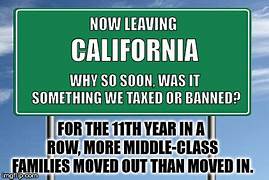This is a brilliant idea. During his first term, Trump moved a couple of agencies out of D.C. Next year, since over half the employees now work remotely, agencies can easily move. For instance, why is the Department of Agriculture in D.C.? It should be in Kansas or Iowa. The Department of energy could be moved to Oklahoma, North Dakota (my preference) or Texas.
“House Speaker Mike Johnson says Republicans have an ambitious plan to reshape and shrink federal government if they win the election. That vision includes a plan to deport tens of thousands of federal bureaucrats from Washington and relocate them to middle America.
In a wide-ranging interview this week with Just the News, Johnson said he and other GOP leaders want to move federal agency offices, personnel and assets from the nation’s capital to bring them closer to the people they serve and farther from the monied special interests that often hijack policy and spending.
“There’s a lot of talk about uprooting, you know, these entrenched bureaucracies and putting them out elsewhere around the country,” Johnson told the John Solomon Reports podcast.
This is cause many to resign or retire—great—fewer to fire.
House Speaker lays out massive deportation plan: moving bureaucrats from DC to reshape government
Mike Johnson says forcing government workers to leave the Washington “swamp” will lead to resignations and retirements that will quickly shrink costs to taxpayers.
By John Solomon, Just the News, 11/2/24 https://justthenews.com/government/congress/sathouse-speaker-lays-out-massive-deportation-plan-moving-bureaucrats-dc
House Speaker Mike Johnson says Republicans have an ambitious plan to reshape and shrink federal government if they win the election. That vision includes a plan to deport tens of thousands of federal bureaucrats from Washington and relocate them to middle America.
In a wide-ranging interview this week with Just the News, Johnson said he and other GOP leaders want to move federal agency offices, personnel and assets from the nation’s capital to bring them closer to the people they serve and farther from the monied special interests that often hijack policy and spending.
“There’s a lot of talk about uprooting, you know, these entrenched bureaucracies and putting them out elsewhere around the country,” Johnson told the John Solomon Reports podcast.
Mike Johnson lays out top priorities for big GOP win: Border, Trump tax cuts, ‘blowtorch’ to weaponized deep state Mike Johnson lays out top priorities for big GOP win: Border, Trump tax cuts, ‘blowtorch’ to weaponized deep state.
He explained such a re-invention of the monstrous federal bureaucracy with more than 2 million federal workers and contractors would integrate with former President Donald Trump’s plan to name billionaire entrepreneur Elon Musk to lead a government efficiency office and also tie to fiscal conservatives’ vision to eliminate federal bureaucracies and send monies to the states in the form of block grants.
The Louisiana Republican said the deportation of Washington bureaucrats would also create a natural shrinkage in the size and cost of government,
“That accomplishes a lot of important goals but the first would be that you don’t have all these career civil service law protected bureaucrats,” he said. “Some of them have been camped out of these agencies for decades. They’re nameless, faceless. We don’t know who to hold accountable,” he said.
Congressional vision
Johnson continued, saying “The idea is, if you move the agency to, you know, northern Kansas or southwest New Mexico, or wherever it is around the country, then some of the swamp dwellers they will not desire to follow the job to the new, less desirable location,” he added. “They love the swamp. You know they want to stay. They’ll turn them into lobbyist or something to stay in D.C.” The mass transfer and departure of bureaucrats then leads to a “business reorganization proposition” for federal government, he said.
“You’ve got agencies that you can scale down because you have empty cubicles and … almost all the agencies are bloated and inefficient,” he said. “So you can scale that down. And then in the cubicles that you do need to fill, we’ve had America First Policy Institute and some of our other think tanks that have been working to develop a notebook full of highly qualified, previously vetted, limited government conservatives who have expertise in these areas.”
Johnson’s comments were the most sweeping he’s made about a congressional vision for shrinking the budget and reshaping the budget. He said the process would take a “blowtorch” to the regulatory state and align government agencies in the aftermath of a historic Supreme Court ruling this summer that reversed a decades old “Chevron doctrine.” Under the new ruling, federal bureaucrats can’t make up or interpret their own regulations and simply must enforce those authorized by Congress.
“We have a once in a lifetime, yeah, once in a lifetime opportunity to really claw back article one authority to the legislative branch under the Constitution and have an administration that is in tune with that whole agenda. So look, I just think there’s almost unlimited potential in front of us, and we’ve got to seize that moment,” Johnson said.
If Republicans do win a majority in the House and Senate, it is likely to be slim, meaning Johnson’s government reorganization ideas would have to appeal to conservatives and moderates alike in his caucus.
One of the leading voices of the House conservative wing, Rep. Andy Biggs, R-Ariz., told the “Just the News, No Noise“ television show Friday that he likes Johnson idea, but with some important caveats like first getting stay-at-home bureaucrats to come back to the office.
“Well, I would prefer an idea where we actually eliminated the bureaucracies and the agencies that need to go away. But here’s the thing: until you stop the telework epidemic the federal government has, it won’t work. So you’re gonna have to first stop that, then you then you can send them out,” Biggs said.
Right-to-work states
He also cautioned Congress not to send unionized federal workers to right-to-work states that give workers and employers more freedoms.
“They’re unionized,” he said of federal workers. “And that means, let’s say you’ve stuck something in Arizona, which is a right to work state, you’d be sending in all these unionized leftist federal bureaucrats to our state, and it would make it even harder to maintain.”
“So if you’re going to send them out, just send them out to a state that’s already deep blue. Send them to California for mercy sakes or or something like that,” he added.
On other issues, Speaker Johnson made clear a GOP-led Congress would be in lockstep with Trump’s already stated agenda to close the border, deport illegal aliens, reduce inflation, renew the Trump tax cuts that expire next year and rapidly improve national security in a turbulent world.
“I think within the hour of President Trump taking this oath of office, he’ll issue an executive order to secure that border,” Johnson said. “We’ll come behind that with legislative action to secure it, seal it up, and then we’ll work on having to deal with the fallout of everybody who was allowed in, and that’s a whole agenda thing.
“But immediately after the border is secured, we go to the economy, because the cost of living is unsustainable, unaffordable, and we know how to fix it … Then we’re going to do that and then somewhere you’re going to have an extension of the Trump era tax cuts,” he explained.
Of course, all of that must be preceded by Republicans winning the Senate, House and White House and Johnson winning another term as Speaker in a fractious GOP caucus. The answer those questions will be decided this month.



